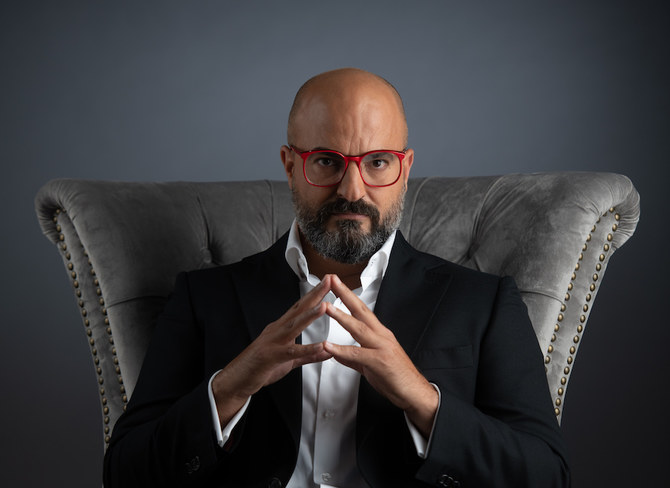
by ALI KHALED — arabnews.com — DUBAI: “The material that appeals to the younger generation is less related to geopolitics and more related to values and emotions: The videos that expose lying, hypocrisy and contradictions, and the filthiness of the political elite across the board, are basically the hits among this generation.” Sky News Arabia’s Nadim Koteich is talking about the radical shift in the Middle East’s media landscape in recent years. And the Lebanese presenter is well placed to do so, as a veteran journalist and broadcaster adapting to that shift. He is known for his biting satirical and political commentary which has proven hugely popular online. His new Monday-to-Friday show, “Tonight With Nadim,” is, he says, a natural progression of his previous work. “Even the most traditional giants in the market are adopting digital strategies in terms of distribution and channeling the message,” he tells Arab News. “My show airs at midnight, but we post it completely on digital before it hits the screen. Before, the (TV) screen was sacred. Now, whenever it’s ready, just put it up. So what kind of short format is reaching the audience becomes a question of content.” Koteich’s 25-minute show aims to tackle the issues of the day via three segments: ‘Fake News’ — two or three quick stories that look to “decode” events and statements; ‘3D’ — a satirical take on the news; and ‘Serious Talk,’ which Koteich calls a “visualized editorial” of the day. It’s a format tailored for modern audiences.
“(People under 30) don’t have the time, they don’t have the stamina, they don’t have the interest in just dry takes,” he says. “They have a love of skepticism when it comes to reading or following politics. They have so much more at their disposal than what conventional media is providing them.” Younger viewers may prefer these “media nuggets,” but Koteich is keen to ensure that older ones are not ignored. It is less about age and more about ideology, he suggests. “We are in an intellectual battle between two main projects in the region: Political Islam and national states,” Koteich, a fierce critic of Iran and Hezbollah, says. “The two audience camps are not divided not only by age groups, but also by communities. (Both have) young, old, and middle-aged groups. I think this dichotomy between age groups is a little misleading, because you need to talk about communities that are a hybrid of age groups.” Koteich, who has over 360,000 Twitter followers, has learned to tune out the background noise of social media over the years. “You grow very thick skin,” he says. “You shouldn’t take (things) personally, because there is a collapse of context when it comes to social media and it’s made the conversation very poisonous. Because people are basically talking to a screen and the emotions are edited out in a very fierce, very dehumanizing way.” This loss of context can lead to the rise of conspiracy theories, he adds.
“Some of those who like my stance on Iran, are the same who get angry at me for criticizing Turkey, Erdogan or Hamas,” Koteich says. “They stereotype you as the person who is criticizing Iran and they are so happy, but when you attack Hamas, it awakens their sectarian tendencies. You shouldn’t get carried away by positive reactions, and you shouldn’t be taken down by negative reactions.” While Koteich’s politics are clear enough, he is prepared to dispassionately give his opinion on other presenters. “I’m a big fan of (‘Daily Show’ presenter) Trevor Noah, he had a big challenge to fill the shoes of Jon Stewart and he did that in a marvelous way. He has transformed the show, it’s much more loaded with racial analysis and issues as opposed to liberal- versus-conservative divisions,” he says, adding that he also admires Tucker Carlson of Fox News for the “clarity of his messages.” Koteich sees the discussion of cultural issues, not just politics, as cause for optimism in the region, something to be explored in his and other programs. “If you look at what the UAE has done in terms of the new laws they have adopted, there’s this hidden dialogue between top-down and down-top that is evolving the legal climate,” he says. “With this happening, more and more space will be created for such discussions.”



